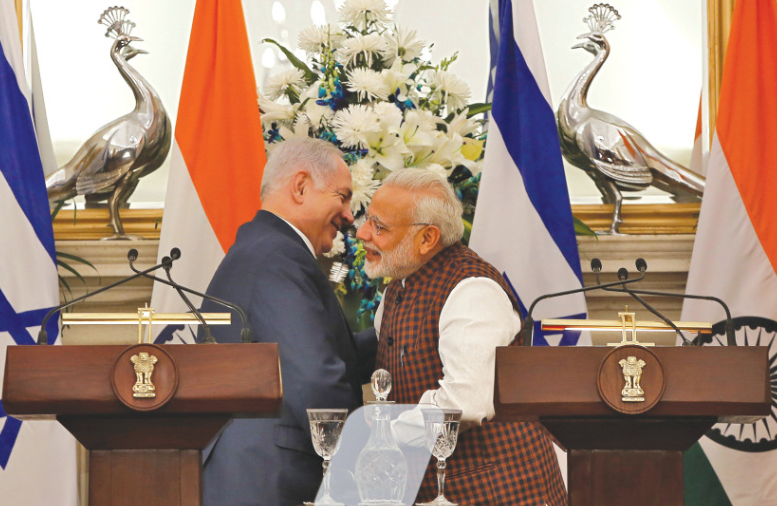India’s Response to the War in Gaza
Smoke arising after an Israeli attack on Gaza City on Thursday, Oct. 12. Photo: AP Photo/Hatem Moussa
The Indian government is showcasing a diplomatic leaning towards Israel, considering the strong ties between the two countries and the strategic partnerships between them. A key factor is also the close friendship that the two prime ministers share. Indian Prime Minister Narendra Modi refrained from taking an absolute neutral position in the Israel-Palestine conflict, unlike his predecessors.
India’s current stance is at odds with India’s historic support for Palestine. The previous government supported Palestine in various United Nations (UN) resolutions and provided regular humanitarian assistance.
Modi’s first official statement came from his X (formerly Twitter) account on Oct. 7, the day of the Hamas attacks. India’s Prime Minister Modi tweeted “Our thoughts and prayers are with the innocent victims and their families. We stand in solidarity with Israel at this difficult hour.” The message was Modi’s first statement on the conflict. He neglected to include any mention of Palestine or Gaza nor the Palestinian Muslims caught in between the violence.
Five days after the attacks by Hamas, India’s Ministry of External Affairs released India’s first official statement on the issue. India’s position maintained that there is a “universal obligation to observe international humanitarian law,” and there is also a global responsibility to fight terrorism. The statement also reiterated India’s position on the wider Israeli-Palestinian conflict, calling for “direct negotiations” toward a “sovereign, independent, and viable state of Palestine living within secure and recognized borders, side by side, at peace with Israel.”
A noticeable shift in India's stance on the Israel-Palestine conflict occurred when Modi came into power in 2014.Israel's assistance in India's conflicts with Pakistan resulted in India's continued support of Israel in the current conflict. Their counter-terrorism vision remains a topic of interest that both prime ministers share. Modi's government is more explicit about its engagement with Israel than any previous Indian government.
Prime Minister of Israel, Benjamin Netanyahu and Prime Minister of India, Narendra Modi hug after a meeting in 2018 in New Delhi, India. Photo: Reuters/Adnan Abidi
In 2017, Modi became the first Indian Prime Minister to visit Israel. The public increase in ties under Modi stood in contrast with the more passive approach the previous ruling Indian National Congress party adopted toward Israel. Moreover, India and Israel are strategic partners in various sectors, including technology, defense, and education.
Despite the growing relations between the two nations, India continued to provide support for Palestine. In 1974, India was the first non-Arab country to recognize the Palestine Liberation Organization (PLO) as the “sole and legitimate representative of the Palestinian people.” The next year, a PLO office was set up in New Delhi.
India has maintained a consistent position of a two-state solution, respecting the sovereignty and integrity of both Israel and Palestine. India invited Palestinian leader Mahmoud Abbas to New Delhi back in 2017, reaffirming India’s commitment for the peaceful coexistence of both parties. The meeting was in the beginning of the same year that Modi invited Prime Minister of Israel, Benjamin Netanyahu to New Delhi. India also took extensive diplomatic steps, such as signing UN resolutions condemning the Israeli occupation.
In multilateral votes after India and Israel normalized ties, India consistently sided with the Palestinian position, including support for Palestine’s application for complete UN membership. India is also actively supporting the humanitarian cause within Palestine, reinforced in Modi’s tweet: “Spoke to the President of the Palestinian Authority H.E. Mahmoud Abbas. I conveyed my condolences at the loss of civilian lives at the Al Ahli Hospital in Gaza. We will continue to send humanitarian assistance for the Palestinian people.”
India’s strategic diplomatic position in the Middle East, coupled with its active support of both Israel and Palestine, poses interesting challenges for the Indian leadership led by Modi and External Affairs Minister Subrahmanyam Jaishankar. In addition, the Indian public perception could strongly shape the diplomatic stance on this conflict, considering the proximity of India’s General Elections scheduled to happen in a few months. As of mid-October, the Indian populus is actively campaigning for peace and negotiation. A series of changes can be expected soon though, warranting India to pick a more stern stance on the issue.


